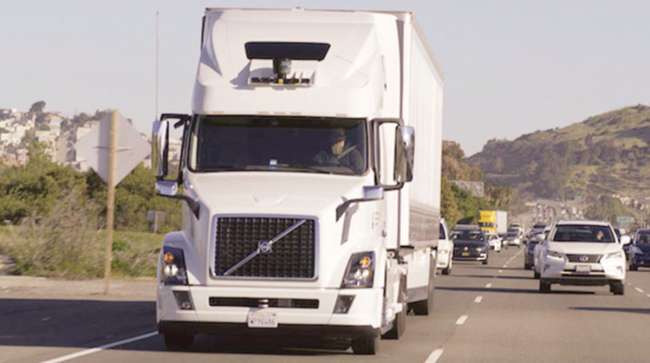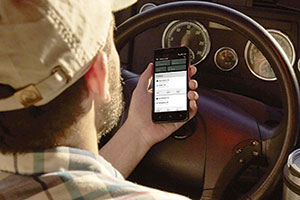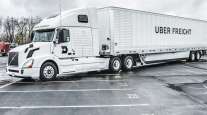Contributing Writer
Uber Narrows Loss in Fourth Quarter

[Stay on top of transportation news: Get TTNews in your inbox.]
Uber Technologies continued to post large losses in the fourth quarter, but said its freight business is growing quickly yet remains unprofitable.
San Francisco-based Uber said it lost $968 million in the fourth quarter, an 11.7% percent decline from the $1.1 billion it lost in the same period a year earlier. It posted a loss of 54 cents per diluted share compared to 64 cents a year earlier. Revenue fell 15.5% to $3.2 billion from $3.7 in the fourth quarter of 2019.
Uber Freight narrowed its losses during the quarter. Using EBITDA, or earnings before interest, taxes, depreciation and amortization, the freight business posted an operating loss of $41 million compared with $55 million in the same period a year earlier.

A truck driver searches for loads using the Uber Freight app. (Uber Technologies Inc.)
But the freight division continues to make significant revenue gains. Sales rose 43% to $313 million compared with $219 million in the same period a year earlier.
Uber said its freight business continued to grow new service offerings and improve efficiency during the quarter mostly through the use of software and application programming interface, or API, tools.
The company is focused on automating the freight booking and shipping business.
Uber Freight Enterprise, for example, grew at double-digit percentages. It allows shippers to source capacity through Uber Freight’s marketplace, controlling for coverage priority and pricing. It also provides large shippers with estimated truck arrival times and digital access to documentation.

What if you could prevent accidents and driver turnover before they happen? In this episode, host Seth Clevenger speaks with two technology CEOs to discuss how machine learning can enable better business decisions and a more proactive stance on safety. Hear a snippet, above, and get the full program by going to RoadSigns.TTNews.com.
The company also said that automated visibility into loads improved to 78% in the quarter, helped by greater integration of electronic logging device data.
The freight division also continues to gain traction with clients, Uber said, winning awards for technology and service. These include Niagara Carrier of the Year, Morton Salt Stellar Performance Award, and Food Logistics Top 100 Software & Technology Provider.
“This continued enterprise and industry recognition further validates the benefits of our digital model to increase visibility, predictability and improve service for our customers,” Uber said in a Feb. 10 news release.
While it continues to grow the freight booking business, Uber did exit one aspect of the trucking business. Uber divested its Autonomous Technologies Group to Aurora Innovation, a San Francisco company developing an autonomous driving system for trucks and other commercial vehicles.
The group was an outgrowth developed from Uber’s 2016 purchase of Otto, a startup that planned to develop a fleet of self-driving trucks. The deal closed in January. It included a $400 million investment in Aurora by Uber.
Aurora now is working with Paccar Inc., owner of the Kenworth and Peterbilt brands, to commercial autonomous trucks.
Uber ended the year with $6.8 billion in cash and short-term investments.
Want more news? Listen to today's daily briefing below or go here for more info:




